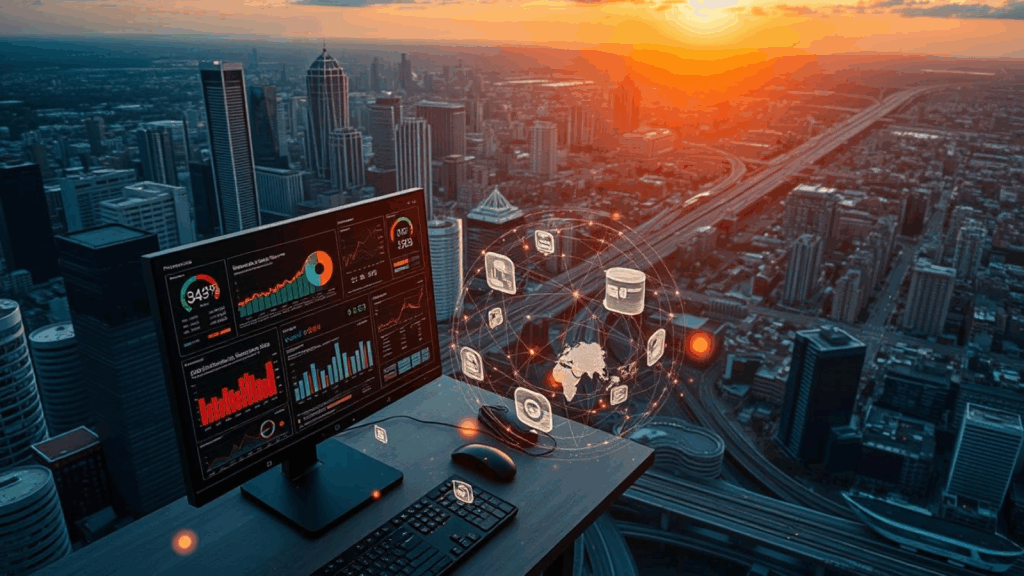The world of property management is dramatically changing, thanks to PropTech. This rapid influx of real estate technology is transforming how properties are managed. It introduces a new level of efficiency and skills. Gone are the traditional methods, now overtaken by innovative digital tools. These changes signify a shift where digital advancements predict the industry’s direction.
PropTech is redefining our approach to tenant interactions and making operations smoother. This change does not just save time and resources. It also opens up new opportunities that were previously unimaginable. Exploring these new tools shows us their evolving nature and how they cater to today’s property management needs.
Key Takeaways
- PropTech is revolutionizing property management by shifting from traditional to digital methods.
- Real estate technology updates are redefining industry standards with improved efficiency and capabilities.
- The digital transformation in real estate enhances tenant interactions and operational processes.
- PropTech paves the way for the future of property management, optimizing time and resources.
- Staying abreast of the latest innovations is crucial for navigating the evolving landscape.
The Evolution of Property Management Through Proptech
The landscape of property management has significantly evolved with the emergence of PropTech. This evolution marks a shift from traditional methods to technology-driven solutions. Smart building innovations and property technology trends have reshaped operational efficiency. They have also improved tenant relations and made data utilization more effective.
The Advent of Proptech
In the initial stages, PropTech brought forth online listing platforms. These platforms revolutionized property marketing and discovery. They simplified the search process, enabling better management of listings. As technology progressed, the influence of big data and AI grew, offering insights into market trends and customer preferences.
Historical Milestones
Several key milestones have defined PropTech’s journey, each inducing significant advancements. The integration of CRM systems improved client management and communication. Meanwhile, AR and 3D imaging technologies enabled virtual tours, creating an immersive experience for users.
Transitioning to technology-driven methods has led to notable enhancements in efficiency and data usage. It has heightened tenant satisfaction as well. The adoption of innovations in real estate allows for prompt responses to market shifts and tenant requirements. This cements PropTech’s essential role in modern property management.
Key Proptech Innovations Transforming Property Management
The proptech industry leads the revolution in property management. Today’s technologies drastically change management tactics. They boost efficiency and introduce innovative digital solutions. AI, VR, AR, and IoT integration mean property managers can enhance the client-tenant relationship.
AI and IoT mark significant shifts in the field. AI helps managers decide quickly based on advanced analytics. Meanwhile, VR and AR make property viewings immersive, simplifying leasing. IoT devices enable continuous property monitoring and predictive maintenance. This helps keep properties in top shape at reduced costs.
Here’s an overview of key innovations:
- Artificial Intelligence (AI): Enhances data analysis and decision-making through predictive analytics.
- Virtual and Augmented Reality (VR/AR): Allows virtual tours and interactive property visualization.
- Internet of Things (IoT): Real-time monitoring and predictive maintenance of properties.
These technologies are reshaping operations and setting new industry standards. As tech evolves, digital solutions for property management will make workflows smoother and elevate tenant happiness. By adopting these technologies, real estate professionals can significantly improve service and efficiency.
Automation and AI in Property Management
The real estate sector is rapidly changing with the rise of automation in property management and AI. These innovations have significantly improved operational efficiency and tenant satisfaction. They allow management teams to shift their focus from routine tasks to strategic decisions.
AI Enhancements
Artificial intelligence is crucial in contemporary property management. It introduces sophisticated solutions for pricing, maintenance forecasting, and tailoring tenant interactions. Notably, AI chatbots offer 24/7 tenant support, providing immediate answers and improving service. These tools help managers base their decisions on data, optimizing both property performance and tenant relations.
Automation Benefits
Automation in property management seamlessly executes mundane yet vital tasks. It simplifies rent collection, maintenance scheduling, and financial report generation. Consequently, property managers can allocate more time to strategic matters such as investment planning and enhancing tenant engagement.
- AI-powered chatbots for around-the-clock tenant support
- Dynamic pricing models driven by AI
- Automated rent collection and maintenance scheduling
AI and automation represent a significant shift in proptech AI advancements. They are revolutionizing efficiency, tenant relationships, and management insights.
| AI Applications | Benefits |
|---|---|
| AI-powered Chatbots | 24/7 Customer Support |
| Dynamic Pricing | Optimized Revenue |
| Predictive Maintenance | Reduced Downtime |
Integrated Platforms for Real Estate Operations
In today’s fast-paced property management world, integrated platforms are vital for enhancing efficiency. These systems unify various real estate operations into one interface. This approach offers a comprehensive way to manage properties more effectively.
System Interconnectivity
The key benefit of Proptech integrated platforms is their ability to seamlessly connect different systems. Property managers can handle everything from tenant communications to maintenance scheduling on one platform. This connectivity ensures smooth data flow and reduces errors and redundancies, boosting efficiency.
Workflow Optimization
Integrated platforms do more than link systems; they optimize workflows. By automating tasks and centralizing data, managers can prioritize strategic tasks. This leads to smarter systems that respond effectively to tenant and property needs. These platforms also align with modern expectations for rentals, payments, and remote work, becoming essential in real estate.
Future Trends and Predictions in Proptech for Property Management
The proptech market is poised for significant expansion, driven by emerging innovations and evolving consumer expectations. Proptech future trends suggest a threefold increase in IoT devices, revolutionizing property management with enhanced connectivity and smarter ecosystem integration. These advancements will enable more efficient data collection. This supports better decision-making through predictive analytics in real estate.
Integrating smart home features within properties is another key trend. It improves tenant experiences and contributes to sustainable practices. This aligns with the broader goals of the proptech market expansion. The seamless integration of technology will allow property managers to offer more personalized and responsive services. This underscores the importance of forward-thinking in the industry.
The technological landscape is constantly evolving. It’s pushing the boundaries of efficiency and functionality in property management. By leveraging predictive analytics in real estate, more accurate forecasting and smarter investment strategies become possible. This also enhances operational efficiencies. As these trends gain momentum, the role of technology in shaping the future of property management becomes more evident. It promises a more connected, responsive, and sustainable industry.
The Potential of IoT and Smart Buildings
The use of IoT has transformed buildings into intelligent entities. This transformation enhances sustainability and how buildings function. It also improves tenant experiences, making environments smarter and more responsive.
Energy Efficiency
Smart buildings, through IoT devices, lead in sustainable property management. Interconnected sensors allow monitoring of energy use in real time. This optimizes HVAC systems, ensuring resources are efficiently used. The result is a smaller carbon footprint and substantial savings.
Tenant Satisfaction
IoT significantly boosts tenant satisfaction by making buildings smarter. Features like automated lighting and climate control add to comfort and convenience. Predictive maintenance and optimized space usage enhance the overall tenant experience.
IoT’s operational advantages offer proactive management and data-informed decisions. These benefits support the rising demand for eco-friendly property management. They ensure high tenant satisfaction as well.
| Feature | Traditional Building | Smart Building |
|---|---|---|
| Energy Monitoring | Manual readings | Real-time IoT sensors |
| Maintenance | Reactive | Predictive |
| Tenant Experience | Standard | Customized via IoT |
| Resource Utilization | Less efficient | Optimized and sustainable |
Challenges and Opportunities for Scalability and Sustainability
In the realm of real estate, embracing PropTech raises key issues. These include scaling operations while ensuring sustainability. As property portfolios grow, it becomes challenging to maintain consistent management. Moreover, integrating sustainable real estate technology is crucial.
When scaling operations, technical property managers face various obstacles. Ensuring systems are adaptable and can manage more data and tenants is vital. Additionally, robust infrastructure and cybersecurity to protect information are essential in PropTech.
On the sustainability front, the push for green building technologies is becoming increasingly important. These technologies not only meet environmental goals but also boost long-term profits. The shift towards energy-efficient solutions, such as smart HVAC systems and eco-friendly materials, highlights sustainability’s role in real estate.
| Challenges | Opportunities |
|---|---|
| Managing large-scale data | Expanding technological infrastructures |
| Integration of sustainable technologies | Increased market attractiveness |
| Cybersecurity concerns | Enhanced tenant satisfaction |
| Operational consistency | Long-term profitability |
In wrapping up, the challenges of scalability and sustainability in real estate, though daunting, offer opportunities. These opportunities are for growth and innovation in the sector. Tackling these Proptech challenges head-on allows the real estate industry to look towards a more efficient, sustainable, and profitable future.
PropTech Enhanced Tenant Relations
The rise of PropTech has markedly improved how tenants interact with their living spaces and property managers. By embracing digital solutions, communications have become more fluid and tailored services a standard. These technological advancements allow for the accommodation of tenants’ evolving preferences with impressive agility.
Improved Communication
Today, digital platforms are integral to effective property management. They bridge the communication gap between tenants and landlords seamlessly. Mobile apps and online portals now empower tenants to report issues or ask questions with immediate responses. This shift towards digital interactions not only improves responsiveness but also fosters a stronger, more content tenant community.
Personalized Services
A hallmark of PropTech is its focus on customization, enhancing every tenant’s experience. Through data analytics, property managers can understand and meet individual tenant needs with precision. Offering services that resonate on a personal level increases tenants’ sense of belonging and satisfaction, driving higher retention.
Global Adoption of PropTech Solutions
The pace at which Proptech global adoption is increasing highlights that its application knows no borders. It’s changing how we experience tenancies and manage properties. These advancements are significantly altering the landscape of the industry.
Proptech expansion varies across regions, molded by each area’s unique laws, needs, and tech infrastructure. In Europe, the rise of smart building technologies and IoT solutions is notable. Conversely, Asia sees a surge in using AI and analytics to enhance decision-making and service.
In North America, the PropTech scene is being revolutionized by virtual reality tours and automated systems. This shift to digital indicates a universal movement towards innovation in real estate.
- North America: Focus on VR and automation for seamless property management.
- Europe: Emphasis on smart building technologies and energy-efficient IoT solutions.
- Asia: Adoption driven by AI-powered analytics and improved customer service solutions.
This is further clarified in the table below, showing PropTech focal points and their uptake across different continents:
| Continent | Key Focus Areas | Adoption Status |
|---|---|---|
| North America | VR, Automation | High |
| Europe | Smart Building Tech, IoT | Moderate |
| Asia | AI, Big Data Analytics | Rapid |
Conclusion
The ongoing digital transformation in property management, marked by PropTech advancements, announces a significant era for real estate. This transition to digital solutions has driven unprecedented efficiency in managing properties.
Property managers are adopting automation, AI, IoT, and integrated platforms, aiming for operational excellence. These technologies facilitate improved tenant relations, personalized services, optimized workflows, and sustainability. This leads to a more streamlined management system, benefitting tenants and owners alike.
The future of real estate technology looks bright with continuing innovation. The industry needs to stay adaptable, using new trends to maintain its lead. PropTech is fundamental in achieving these digital transformation goals, playing a key role in evolving property management.
FAQ
What is PropTech, and how is it transforming property management?
PropTech, which stands for property technology, introduces tech advancements to the real estate sector. It uses AI, IoT, and VR to improve property management efficiency. These innovations turn time-consuming manual processes digital.
What are some key historical milestones in the evolution of PropTech?
Milestones in PropTech’s history include the rise of online listing platforms and the use of AI and big data. CRM systems, AR, and 3D imaging have also played a part. Together, they have streamlined operations and reshaped tenant interactions.
How are AI and automation benefiting property management?
AI and automation have been game-changers in property management, handling routine tasks and aiding in strategic planning. They also offer non-stop operational support. For instance, AI chatbots enhance customer service, while automation simplifies rent and maintenance handling.
What role do integrated platforms play in real estate operations?
Integrated platforms play a crucial role by enhancing connectivity and optimizing workflows in real estate. They not only save time but also boost transactional efficiency. This supports modern ways of renting and paying, a need amplified by the shift to remote work.
What future trends in PropTech should we expect in property management?
Anticipate more IoT devices, smarter home technologies, and advancements in analytics. These will focus on property management’s efficiency and sustainability.
How does IoT contribute to the development of smart buildings?
IoT is vital for smart buildings, improving energy use, maintenance, and space management. It leads to environments that respond to user needs, enhancing both tenant satisfaction and operational performance.
What challenges and opportunities are associated with scaling and sustainability in PropTech?
Expanding PropTech solutions to cover extensive property portfolios while maintaining eco-friendly practices is challenging. Yet, investing in sustainability is essential for attracting the market and securing long-term profits.
How does PropTech enhance tenant relations?
PropTech boosts tenant interactions through improved communication and tailored services. It enables digital platforms to offer straightforward, customized experiences, meeting the high expectations of tech-savvy tenants.
What does the global adoption of PropTech look like?
Worldwide, PropTech is being increasingly embraced, showcasing its varied uses and growing acceptance in different areas. This points to the significant, global transformation effect of real estate technologies.






